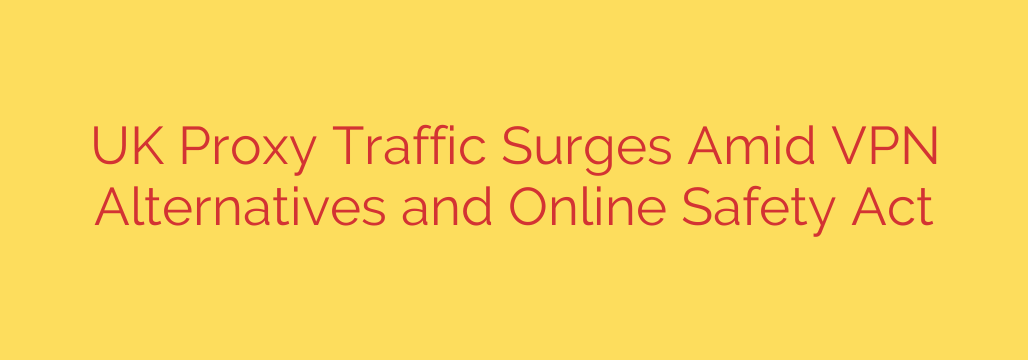
The Rise of UK Proxies: Navigating Privacy in the Age of the Online Safety Act
A notable trend is emerging across the UK’s digital landscape: a significant and accelerating adoption of proxy servers. This isn’t just a niche movement among tech enthusiasts; it’s a mainstream response to a changing internet environment, driven by growing privacy concerns and the introduction of sweeping new legislation.
For internet users in the United Kingdom, tools that enhance anonymity and digital freedom are no longer just optional—they are becoming essential. Let’s explore the key factors behind this surge and what it means for the future of online activity.
What is a Proxy Server?
Before diving into the “why,” it’s important to understand the “what.” A proxy server acts as an intermediary, or a gateway, between your computer and the internet. When you use a proxy, your internet traffic is routed through the proxy server first. This means the websites you visit see the proxy’s IP address, not your own.
This simple rerouting has powerful implications, effectively masking your digital location and identity from the websites and services you interact with.
The Driving Forces Behind the UK Proxy Surge
The sharp increase in UK proxy usage isn’t happening in a vacuum. It’s a direct consequence of several converging factors, with new legislation being a primary catalyst.
1. The Online Safety Act and Privacy Concerns
Perhaps the single most significant driver is the implementation of the UK’s Online Safety Act. While aimed at protecting users from harmful content, the act introduces measures that have prompted a strong reaction from privacy advocates.
Key provisions include:
- Mandatory Age Verification: Many platforms will be required to implement strict age checks, potentially involving the submission of official ID, to filter content deemed “harmful to children.”
- Proactive Content Monitoring: The act encourages platforms to use technology to scan for and remove illegal content, raising concerns about mass surveillance and the potential for censorship.
In response, many UK citizens are turning to proxies to maintain their privacy and bypass what they see as intrusive data collection. A proxy with a UK IP address allows a user to appear as a legitimate, anonymous UK resident, navigating around verification systems without revealing their personal identity.
2. Moving Beyond Traditional VPNs
For years, Virtual Private Networks (VPNs) have been the go-to tool for online privacy. While still popular, sophisticated users and businesses are realizing that proxies, particularly residential proxies, offer distinct advantages.
A VPN encrypts all your traffic and routes it through a server, which is great for general security. However, VPN IP addresses are often easily identified and blocked by websites. Residential proxies use real IP addresses assigned by Internet Service Providers (ISPs) to actual homes. This makes them virtually indistinguishable from regular user traffic, making them far more effective at avoiding detection and blocks.
3. The Boom in E-commerce and Data Analysis
Beyond personal privacy, proxies are a crucial tool for business and e-commerce. UK proxies are in high demand for:
- Market Research: Businesses scrape website data to compare prices, monitor competitor stock levels, and analyze market trends.
- Ad Verification: Companies use proxies to check how their digital ads are being displayed in different regions across the UK, ensuring they aren’t victims of ad fraud.
- Accessing Geo-Restricted Content and Deals: Consumers and businesses alike use proxies to access UK-exclusive pricing, streaming services, or product releases.
Actionable Tips for Using Proxies Safely
As more people explore using proxies, it’s crucial to prioritize security and effectiveness. If you’re considering using a proxy service, keep these tips in mind:
- Choose a Reputable Provider: Not all proxy services are created equal. Avoid free proxy lists, which are often unreliable, slow, and can pose serious security risks. Opt for a paid, vetted provider with a strong reputation for privacy and customer support.
- Understand the Different Types: Know the difference between datacenter, residential, and mobile proxies. For tasks requiring high anonymity and a low block rate (like navigating the Online Safety Act’s restrictions), residential proxies are generally the superior choice.
- Check the Legality and Ethics: While using a proxy for privacy is perfectly legal, ensure your activities (such as data scraping) comply with the terms of service of the websites you visit and local regulations.
- Combine with Other Security Practices: A proxy is one layer of your security. Continue to use strong, unique passwords, enable two-factor authentication, and be cautious about the information you share online.
The Future of a More Private UK Internet
The surge in UK proxy traffic is a clear signal that users are proactively seeking control over their digital lives. As legislation like the Online Safety Act continues to be rolled out, the demand for tools that protect user anonymity and freedom is only expected to grow. This shift indicates a more informed and empowered user base that values privacy not as a luxury, but as a fundamental right in the digital age.
Source: https://go.theregister.com/feed/www.theregister.com/2025/08/08/proxy_usage_jumps_in_uk/








